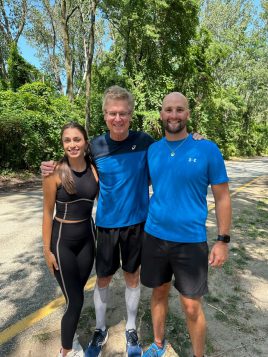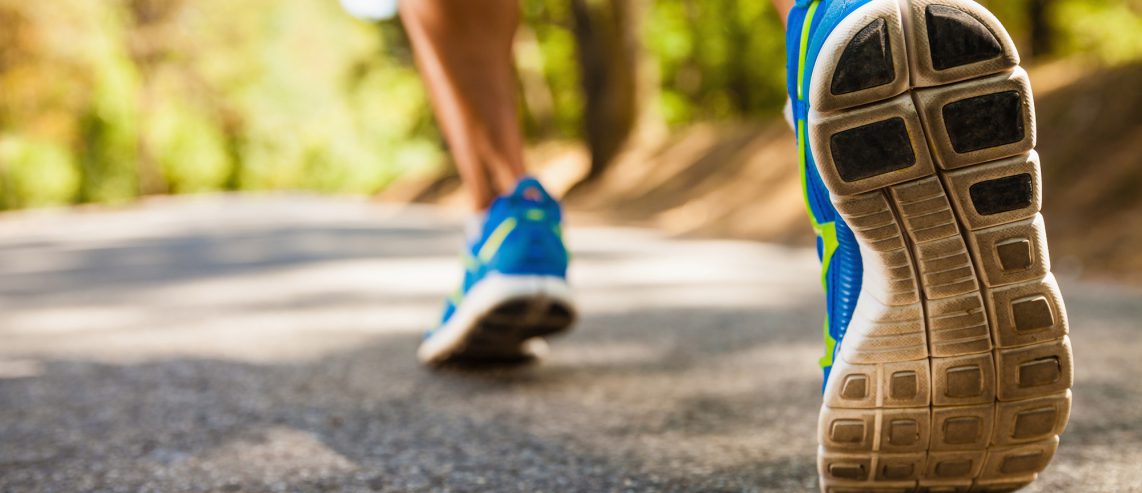Against the odds.
Lucky.
In the right place, at the right time.
All these statements describe Greg Woodman on July 16, 2023.

The day started off with anticipation and excitement. Greg, a 65-year-old resident of State College, Pa., and his two sons, Joe and Nate, were ready to run in the Presque Isle Half Marathon in Erie, Pa. Greg’s third son, Brad, a hospitalist at UPMC St. Margaret, was cheering them on from home.
Greg previously had run one full marathon and six half marathons, so he was physically prepared. However, for this race, he was mentally exhausted. His 92-year-old father had passed away just a few days earlier. Running was an outlet for Greg, so he knew that the half marathon would help clear his mind.
This was Greg’s first visit to Erie. He and his sons wanted to run the half marathon so they would be better prepared for the city’s full marathon in September. The trio started the race together and ran for the first few miles before Greg encouraged them to go ahead of him at their normal pace. Just before the 4-mile mark, Greg started to feel a bit off. Anticipating he might collapse, he instinctively headed towards sand.
Never Miss a Beat!
Subscribe to Our HealthBeat Newsletter!
Thank you for subscribing!
You can now select the specific newsletters you'd like to receive.
You are already subscribed.
Subscribe to more newsletters in our email preference center.
Sorry, an error occurred. Please try again later.
Get Healthy Tips Sent to Your Phone!
Nearby Runners Jumped into Action
That’s when Greg suffered a heart attack that put him into cardiac arrest. He was unconscious and did not have a pulse. Nearby runners who witnessed his collapse immediately jumped into action, including two UPMC Hamot employees: Mikaela Hess, a nurse in the emergency department, and nursing intern Austin Boesch. Both used their medical training to perform CPR.
Other trained runners joined Mikaela and Austin, and each took turns performing 30-second rounds of chest compressions. Mikaela noted that in the six minutes it took for the ambulance to arrive, about 10 runners helped to perform CPR, with additional runners calling for help, directing traffic around the scene, and alerting race volunteers.
Once the EMS team arrived, they immediately used an automated external defibrillator (AED) to shock Greg’s heart back into a normal rhythm. According to the National Institutes of Health, a person in cardiac arrest will usually die within a few minutes if the heart is not shocked back into a normal rhythm. Only 10% of people who suffer cardiac arrest outside of a hospital survive.
Greg’s pulse returned, but he was still unconscious. He was rushed to UPMC Hamot, where he was immediately assessed and treated for a heart attack.
Knowing that Greg was in good hands inside the ambulance, the runners who helped him finished the race. Running on adrenaline and having Greg on their minds helped them to complete the nine miles they had left to go.
Arterial Blockages Revealed
Diagnostic tests performed at UPMC Hamot showed two blockages in Greg’s circumflex artery, which supplies blood to the outer side and back of the heart. Those blockages most likely triggered a heart attack that caused Greg’s cardiac arrest.
It’s unusual for someone who runs marathons to suffer cardiac arrest, says Jean Moubarak, MD, the UPMC Heart and Vascular Institute cardiologist who treated Greg.
“It’s a surprise, but we have seen it before,” Dr. Moubarak says. “That’s when we look at cholesterol levels, family history, and related risk factors.”
Gurjaipal Kang, MD, interventional cardiologist with UPMC Heart and Vascular Institute, placed two stents in Greg’s artery to restore blood flow. Greg felt well enough to be released from UPMC Hamot on July 19 to return to State College.
While Greg will need cardiac rehabilitation and additional testing, Dr. Moubarak says he should be able to resume running marathons. His rehabilitation process includes walking several miles a day. Greg says he will continue to swim, run, and stay active.
An Extraordinary Recovery
“Greg’s recovery is extraordinary,” Dr. Moubarak says “Not only did he survive, he also didn’t suffer permanent damage to his heart or brain. He was lucky he had people around him who knew advanced life support and started it immediately. Doing CPR is enough to maintain blood flow to the brain until a normal heart rhythm can be restored.”
In an emergency, minutes matter. You never know when you might find yourself at the scene of an accident, cardiac arrest, overdose, or other crisis situation. From calling 911 – and knowing what to say – to clearing a path for emergency professionals, even the most basic knowledge can save lives and improve outcomes.
UPMC launched Minutes Matter to provide community members with access to basic emergency information and education about lifesaving interventions. Early intervention is very important, and in Greg’s case, was critical to his survival.
When Greg first regained consciousness, one of his first thoughts was feeling bad about ruining everyone’s running times. He also felt overwhelmed with gratitude upon hearing about the number of people who stopped to help him.
Greg feels fortunate to have had the right people surrounding him at the race, and then to receive care with the cardiovascular experts at UPMC Hamot. He hopes to come back to Erie in September to support his son in the Erie Marathon and to meet up with some of the fellow runners who helped save his life.
“The whole thing was just luck. Lucky in that I was around people who were trained in CPR and then going into Hamot,” Greg said. “Had I been running by myself in the woods when this happened, I wouldn’t be here now.”
About Heart and Vascular Institute
The UPMC Heart and Vascular Institute has long been a leader in cardiovascular care, with a rich history in clinical research and innovation. As one of the first heart transplant centers in the country and as the developer of one of the first heart-assist devices, UPMC has contributed to advancing the field of cardiovascular medicine. We strive to provide the most advanced, cutting-edge care for our patients, treating both common and complex conditions. We also offer services that seek to improve the health of our communities, including heart screenings, free clinics, and heart health education. Find an expert near you.
